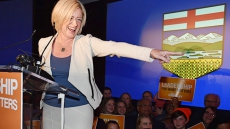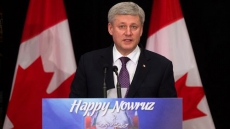EDMONTON — Incoming Alberta Premier Rachel Notley made history Tuesday by defeating a campaign of fear and anger with a laser-focused populist message that government is about making life better for Albertans one family at a time.
"Community means knowing in your heart that our families are better off when all our families are better off," Notley, 51, told more than 1,000 cheering supporters in Edmonton two days before the vote.
Observers said Notley ran a near-flawless campaign with the highlight being her victory over Premier Jim Prentice in the televised leaders debate. Under constant attack by Prentice, she calmly stuck to the facts, smiled warmly at the camera, and suddenly made "Rachel Notley" a familiar name across the country.
She delivered an unwavering message of creating jobs through tax incentives, promoting oil-refining jobs at home and restoring cuts to health care and to classrooms.
When the Tories responded in the campaign's late stages with attack ads, warning that an NDP government would stifle entrepreneurism and kill jobs, she responded with a message of optimism, exhorting Albertans to embrace a new path rather than run from it.
It has been a short but stellar rocket ride for Notley, the daughter of Alberta NDP pioneer and one-time party leader Grant Notley. She won the party leadership in October, taking over from Brian Mason while still in her second term as the member for Edmonton-Strathcona.
Her tenure has been short, but her political roots run deep.
She was born on April 17, 1964, the oldest of three children, to Grant and Sandy Notley, and grew up in Fairview in northern Alberta.
She wasn't even 10 years old when she went on her first protest march. It was in the early 1970s, in Edmonton, with her mother.
"She took me on some anti-war demonstration. I honestly can't even remember what it was," said Notley in an interview last year.
"I remember walking across the High Level Bridge and thinking, 'Wow, this is really a very long walk.' You know, I was a kid."
What stuck with her was the energy of people coming together to try to change things.

"It was just about really doing everything you can to be heard," she said.
"A (protest) letter is easily dismissed. Five hundred people marching together is less so."
Her father helped found the Alberta NDP and turned it from a fledgling, pass-the-hat movement in 1962 into a party that would become the official Opposition with 16 seats in 1986. He won a seat in the legislature in 1971 and for years was the only NDP member under the dome.
Grant Notley built a popular following. He became known for his sometimes quixotic fight for social justice, but also for reasoned and razor-sharp analysis and the ability to see beyond the means to focus on the ends.
But he never saw his party's first big breakthrough. Rachel Notley was 20 when her father, on his way home from Edmonton on a snowy night in October 1984, was killed in a plane crash.
Thousands mourned and in the years that followed, Grant Notley's stature has grown. A park has been named for him in Edmonton and his riding has been renamed Dunvegan-Central Peace-Notley.
Life went on.
Rachel Notley earned a political science degree from the University of Alberta, then a law degree at Osgoode Hall. She set to work as a labour lawyer, helping injured workers with compensation claims, and moved to British Columbia to work with the NDP government under then-premier Mike Harcourt.
As an adviser to that province's attorney general, she was at the table when legislation was drafted to improve occupational health and safety rules and to extend benefits for same-sex couples.
It was there, she said, helping to draw up the rules that changed people's lives, that she realized it was time to come home. She entered Alberta politics in 2008.
Now, she and her husband, Lou Arab, live with their two children in Edmonton, working to make life better for their family one day at a time.
On Wednesday, Rachel Notley will begin to fulfil her promise to do the same for millions more.
WHAT COULD ALBERTA LOOK UNDER THE NDP? A LOOK SOME OF THE PARTY'S KEY PROMISES
EDMONTON — The NDP have won a majority in Alberta. What could Alberta look like moving forward? Leader Rachel Notley campaigned on having the wealthy pay more to fund better health care and education. Here's a look at some of the party's key platform planks:

— A Resource Owners’ Rights Commission to review the royalties oil companies pay to the province with any amount earned above the current rates going into savings.
— A boost in the corporate tax rate to 12 per cent from 10 per cent and an increase in the minimum wage to $15 and hour by 2018.
— More tax brackets on high earners than the Tories are proposing: A 12 per cent tax rate on income between $125,000 to $150,000; 13 per cent on income between $150,000 to $200,000; 14 per cent between $200,000 and $300,000 and 15 per cent over $300,000. The NDP also plans to roll back the Tory health levy.
— The creation of 2,000 long-term care spaces over four years.
— A ban both corporate and union donations to political parties.
A LOOK AT ALBERTA'S ELECTION SINCE THE PROVINCE WAS CREATED IN 1905
Nov. 9, 1905: Lawyer Alexander Rutherford, son of a Scots immigrant farmer, leads the Liberals to a lopsided victory over R.B. Bennett's Conservatives, taking 22 of 25 legislature seats. Bennett goes on to become prime minister.
March 22, 1909: Liberals sweep the polls, winning 36 of 41 seats, largely due to support from farmers and immigrants. Rutherford, however, gets the boot. Public outrage over a generous contract awarded to a railway to build a line to Fort McMurray forces him to resign in 1910.
April 17, 1913: Liberals choose Alberta Chief Justice Arthur Sifton as premier in a bid to restore public trust. He leads them to their third consecutive victory _ winning 39 of 56 seats _ and into Prohibition. Women win the right to vote provincially in 1916.
June 7, 1917: Liberals keep their grip on power, winning 34 of 56 seats. Women vote for first time provincially, but must wait two more years for the right to vote federally. The first oil boom in Turner Valley goes bust. Alberta has one of the highest enlistment and casualty rates of the First World War. More than 45,000 head off to fight; more than 5,000 don't return.
July 18, 1921: Farmers and miners, disenchanted with old-line parties, sweep Liberals from power. The United Farmers of Alberta, led by Henry Wise Wood, win 38 of 61 seats but Wood declines to be premier. His caucus chooses farmer Herbert Greenfield. Alberta's Famous Five _ Nellie McClung, Emily Murphy, Louise McKinney, Irene Parlby and Henrietta Edwards _ begin their fight for women to be recognized in law as ``persons.'' Prohibition is repealed in 1923.
June 28, 1926: John Brownlee, who succeeds the ineffectual Greenfield in 1925, leads the UFA to a second term, winning 43 of 61 seats. A bookish lawyer tutored by R.B. Bennett, Brownlee begins balancing budgets, selling provincially owned railways and securing control of natural resources. The British Privy Council in 1929 declares that women may hold public office.
June 19, 1930: Neo-conservative Brownlee takes the UFA to a third term with 39 of 63 seats but soon faces heat over his policies and personal life. He is dragged into court in a sex scandal. He resigns as premier in July 1934 and is replaced by R.G. Reid. The Great Depression produces soup kitchens, bread lines and protests.
Aug. 22, 1935: A Boston newspaper headline screams ``Alberta Goes Crazy'' as William Aberhart's Social Credit League sweeps to power amid drought and farm bankruptcies. The radio evangelist, dubbed ``Bible Bill,'' mixes politics and religion to grab 56 of 63 seats, but is unable to keep his promise to pay each Albertan a monthly $25 dividend. By 1936, with Alberta's debt and interest payments sucking up half the province's annual revenue, Aberhart hikes income taxes and introduces a sales tax and 22 backbenchers call for his resignation.

March 21, 1940: Aberhart wins another term, taking 36 of 57 seats. The victory comes despite his decision to repeal an MLA recall act when it is employed against him and despite his introduction of a raft of other laws the Supreme Court finds unconstitutional. Among them is one that attempts to muzzle the news media. When Aberhart, 64, dies in 1943, he is succeeded by trusted lieutenant Ernest Manning.
Aug. 8, 1944: Moving the Socreds farther to the right, Manning wins 51 of 57 seats. While Aberhart had battled big banks, Manning wages war on socialism. Nearly half of the province's adult male population enlists to fight in the Second World War. Oil is discovered near Leduc, just south of Edmonton. Coalfields are booming.
Aug. 17, 1948: Manning takes 51 of 57 seats again. After lobbying Ottawa to return 22,000 Japanese war detainees to British Columbia, he relents and gives them permission to remain. Manning drags Alberta out of debt. The discovery of seven more oilfields puts the province on the path to prosperity.
Aug. 5, 1952: Another massive majority for Manning. The Socreds win 53 of 57 seats. After initial reluctance, Alberta agrees to ship natural gas to Central Canada. Two pipelines are constructed.
June 29, 1955: Manning wins another election, but this time with a slimmer majority. Socreds take 37 of 61 seats. The economic boom continues. By 1957, Alberta spends more per capita than any other province. In 1957 and 1958, the Socreds give Albertans $21 million in oil dividends.
June 18, 1959: Manning clinches another massive majority, winning 61 of 65 seats on a platform of free enterprise and opposition to national medicare and bilingualism. Despite personal views against lewd behaviour and drinking, Manning eases restrictions on movie censorship and booze.
June 17, 1963: The Manning machine roars along, gobbling 60 of 63 seats. Despite the premier's strong commitment to individualism and opposition to socialism and unions, Alberta's per capita spending on social services exceeds the national average. Manning's government gives aboriginals the right to vote in provincial elections.
May 23, 1967: Manning wins his seventh election. Harvard-trained lawyer Peter Lougheed comes onto the political scene, picking up six seats for the Progressive Conservatives and capturing 26 per cent of the vote. Manning resigns in 1968 to enter the corporate world, leaving behind a stunned caucus and no obvious successor. Harry Strom, a soft-spoken Bow Valley rancher, fails to spark new life in the party.
Aug. 30, 1971: Campaigning on the need for change without actually criticizing the Socreds, Lougheed's Tories win 49 of 75 seats. The Socreds are reduced to a 25-member opposition. Lougheed begins delivering on the party's 120 election promises and repeals Alberta's sexual sterilization law. Good times begin to roll. Over the next decade, Alberta's gross domestic product increases sixfold.
March 26, 1975: Tories win 69 of 75 seats. Lougheed establishes the Heritage Savings Trust Fund with skyrocketing oil and gas revenues, promotes Fort McMurray's oilsands and rattles sabres with Ottawa over ownership of resources.
March 14, 1979: Lougheed continues to wage war with Ottawa over oil-pricing controls that economists estimate cost the province $50 billion. Albertans reward him with another resounding majority _ 74 of 79 seats. Anger with Ottawa over oil policy sees birth of the bumper stickers: "Let the eastern bastards freeze in the dark" and "This car doesn't brake for Liberals."
Nov. 2, 1982: Recession hits Alberta but doesn't dampen voter faith in Lougheed's Tories, who win 75 of 79 seats. But oil company layoffs signal an era of unemployment, bankruptcies and bank failures. Popular NDP leader Grant Notley, one of only two New Democrats in the legislature, dies in a 1984 plane crash. Lougheed retires in 1985.
May 8, 1986: Don Getty gets the party nod and leads the Tories to another majority government. Tories win 61 of 83 seats. Oil slips from US$44 to $10 per barrel and Getty is forced to put the brakes on spending. He hikes taxes and imposes cuts in health, education and social services.
March 20, 1989: Getty is punished for calling a snap election by losing his own seat but his party remains in power with 59 of 83 seats. Getty later wins a byelection. He survives a 1990 leadership challenge but huge losses of public money in bad government investments overshadow his tenure. He steps down in 1992, leaving behind as part of his legacy Alberta's February Family Day holiday.
June 15, 1993: Liberals under former Edmonton mayor Laurence Decore appear poised to seize power but lose the brass ring to populist Tory premier Ralph Klein. Klein, a former Calgary mayor and Getty's environment minister, had earlier defeated cabinet colleague Nancy Betkowski (later Nancy MacBeth) in a leadership race. Tories win 51 of 83 seats on a platform of severe program cuts, government downsizing and privatization of services.
March 11, 1997: The Tories ride Klein's folksy appeal to a 63-seat majority. Despite Klein's heavy cuts, his popularity is aided by big budget surpluses fuelled by lucrative oil and gas royalties. The Liberals, led by Grant Mitchell, win 18 seats.
March 12, 2001: Klein and the Tories capture 74 seats and win back parts of Edmonton, which had been shut out to them since the mid-1980s. Klein defeats former-Tory-rival-turned-Liberal-leader Nancy MacBeth, who fails to win her own Edmonton riding. High oil and gas prices pump billions of dollars into the Alberta economy, allowing enough money to be set aside by April 2005 to pay off the balance of the $23-billion debt.
Nov. 22, 2004: Klein's Tories record a 10th consecutive majority win but lose seats for the first time since Klein took charge in 1992. The NDP and Liberals make gains in Edmonton and for the first time since 1997 the Liberals win in Calgary. The new Alberta Alliance party elects its first member. Klein resigns as Tory leader in 2006 after getting 55 per cent support in a leadership review.
March 3, 2008: Ed Stelmach takes over the Tories and returns the party to a large majority. They win 72 of 83 seats while the Liberals take nine and the NDP two. The Alberta Alliance, now named the Wildrose Alliance, loses its lone seat held by party leader Paul Hinman. Despite the victory, Stelmach doesn't survive the term. Faced with a recession that cripples the province's finances, Stelmach runs Alberta's first deficit in more than a decade and is forced out in 2011 by pressure from within the party.
April 23, 2012: With Klein's debt-free legacy in tatters, the Tories and their new leader, Alison Redford, seem ripe for defeat. Much of the party's socially and fiscally conservative base migrates to the Wildrose and its new leader Danielle Smith. Several missteps in the final days of the campaign, coupled with Redford's ability to win support from labour groups, leads to an unexpected Tory victory, although the majority is reduced to 61 seats. Like Stelmach, however, Redford doesn't survive a term rocked by spending scandals. Smith and 10 other Wildrose members cross the floor to the Tories after Jim Prentice is elected leader and premier in 2014.

May 5, 2015: The NDP wins its first majority government toppling the Progressive Conservatives. The party under leader Rachel Notley sweeps Edmonton and makes inroads in Calgary, Lethbridge and rural areas. The Wildrose wins enough seats to form official Opposition. The Tories have to settle for third. Prentice resigns the leadership effective immediately.






